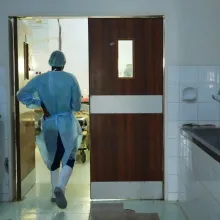In a significant step toward eliminating cervical cancer in Rwanda by 2027, Partners In Health (PIH), in collaboration with the Rwanda Biomedical Center (RBC), successfully screened more than 17,000 women for cervical cancer in Kirehe District.
The large-scale screening campaign is part of Rwanda’s national effort to prevent and treat cervical cancer early—one of the most preventable yet deadly diseases affecting women in Rwanda and around the world.
Over a two-month period, the district hospital and health centers across Kirehe district opened their doors to women aged 25 to 65, offering free screening services and raising awareness about the importance of early detection. The campaign combined community outreach, education sessions, and clinical services to ensure that even women in the most remote areas could participate.

Diane Rutayisire Umuhoza, Women’s Cancer Early Detection (WCED) mentor from RBC, meets with patient Francine Nikuze to discuss her HPV test results and explain the next steps.
Among those who came for screening was Nikuze Francine, a mother of three from Rwesero Sector, who decided to get screened after losing her mother to cervical cancer.
“I came because my mom died of this disease, and we didn’t know what she was suffering from until the hospital told us, so when I heard the community health worker saying that we can be examined early and treated if something is found, I came.” Said Francine.
Francine’s story reflects the power of awareness and access to life-saving services.
“PIH stepped in to support cervical cancer screening as part of the national campaign led by the Office of the First Lady to eliminate cervical cancer by 2027,” said Dr. Eric Baganizi, PIH Rwanda’s Director of Clinical Services. “Early screening and timely treatment are key in eliminating cervical cancer”
Through close collaboration with community health workers and RBC, the campaign strengthened local capacity to raise awareness and deliver quality screening services. Women who tested positive were referred for follow-up care and treatment, supported by trained healthcare providers and community health workers. The 17,000 women screened represent 70% of women in Kirehe District, which aligns with the World Health Organization’s target for eliminating cervical cancer.
As Rwanda continues its journey toward a cervical cancer-free future, stories like Francine’s highlight the lasting impact of PIH’s work in communities—raising awareness, strengthening health systems, and ensuring women have access to the care they need.



